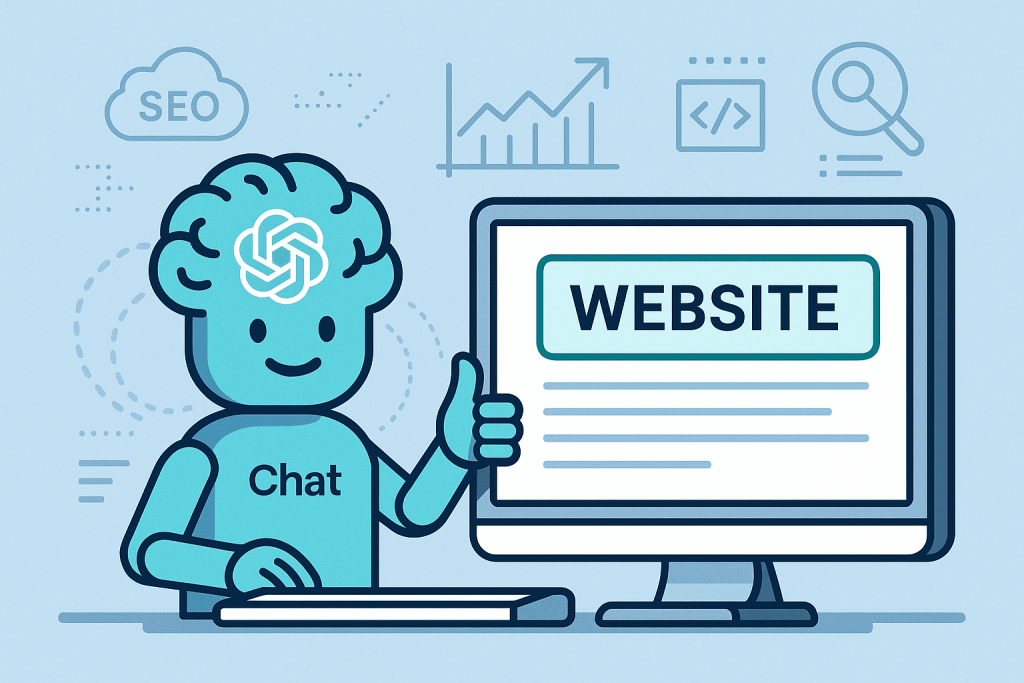
Today, search engines are no longer the only source of traffic. More and more users turn to artificial intelligence for advice: “Where can I order hosting?”, “Which server is best for an online store?”, “Which Ukrainian service provider is reliable?”. And ChatGPT provides answers. But how do you make sure that your website is among those recommended?
While ChatGPT is not a classic search engine crawler, it also relies on publicly available online content. If you want AI to recommend your site, you need to make sure that it “knows” about your site and “trusts” it.
1. How ChatGPT’s Recommendations Work
First, an important note: ChatGPT doesn’t browse the internet in real-time, like Googlebot does. It uses data embedded in the model during training (for example, up to a certain date), or obtained through plugins, browser access, or APIs, depending on the version and configuration.
In other words, the model generates responses based on:
- popular information sources;
- frequently cited websites;
- authoritative platforms that mention your brand or services;
- well-optimized, clearly structured websites.
Your goal is to make your website visible to the algorithms and appear trustworthy.
2. SEO: The Key to Visibility
To be recognized not only by Google but also by ChatGPT, you need to take care of all aspects of SEO:
Content First
Your articles, service descriptions, and blog posts should:
- be useful and expert-level;
- answer actual questions your audience asks;
- contain keywords people use to find you;
- follow a clear structure — headings, lists, subheadings, and short paragraphs.
For instance, if you offer VPS hosting — write a series of blog posts like: “What is VPS and who needs it?”, “VPS vs shared hosting: pros and cons”, “Why VPS is better for eCommerce sites”.
Technical Optimization
AI doesn’t “see” the visual layout of your website — but:
- page speed,
- SSL certificate,
- mobile responsiveness,
- logical site structure and sitemap —
are all signals used by both search engines and AI tools.
Also, an SSL certificate is not just about security — it’s a strong indicator of trustworthiness, without which ChatGPT is unlikely to recommend your site.
3. Build Authority Across the Web
ChatGPT doesn’t invent websites. It recommends those it has seen before. Training data often includes:
- Wikipedia
- Reddit, StackOverflow, and tech forums
- Authoritative blogs
- News platforms
- Media coverage
- Partner mentions
That’s why you need to increase brand visibility across reputable sources. Ways to do this include:
- guest blog posts;
- press releases;
- mentions on partner websites;
- listings in company directories;
- contributions to professional communities.
Each quality mention is a “seed” that could grow into a recommendation from ChatGPT.
4. Implement Structured Data (Schema.org)
Why use structured data?
Because it helps not only Google but also AI tools better understand what your page is about. For example:
- whether it’s a service page or just content;
- which prices are shown;
- what benefits are offered;
- who the company owner is.
If you provide server rental or colocation services, structured data can help you present all relevant details in a machine-readable format — increasing the chance that AI models will “pick you up”.
5. Your Website Must Stay Active
ChatGPT is more likely to trust websites that:
- regularly publish new content;
- maintain an active blog;
- update pages, prices, or service terms;
- are clearly not abandoned.
This is especially critical in tech — where information becomes outdated fast. If your VPS hosting page hasn’t been updated in 2–3 years, the chance of being recommended is very low.
6. Optimize for Voice and AI Search
Most ChatGPT users ask clear and concise questions like:
- “Which server is best for CRM systems?”
- “Where can I get secure Ukrainian hosting?”
- “What is an SSL certificate and why is it needed?”
To appear in such answers, you should create content that addresses popular queries directly. Here’s how:
- add FAQ sections to your pages;
- use question-based headings;
- write brief and accurate answers (1–3 sentences).
This makes your site more understandable not only to users, but also to machines.
7. Blogging: A Long-Term Asset
A blog is not just a news channel — it’s:
- a consistent source of organic traffic;
- proof of your expertise and activity;
- a gateway into AI-driven responses.
Write helpful blog posts such as:
- “Benefits of hosting servers in Ukrainian data centers”;
- “5 signs you need VPS instead of shared hosting”;
- “What is an SSL certificate and how to get one?”
Each of these articles strengthens your web presence and improves the chances of being cited by AI tools like ChatGPT.
Summary: 7 Steps to Get Recommended by ChatGPT
- Perform technical SEO: fast loading, mobile-friendliness, security.
- Create valuable, structured, and expert content.
- Use Schema.org for structured data markup.
- Get mentioned on reputable external websites.
- Keep your website fresh and regularly updated.
- Address voice and AI queries directly in your content.
- Ensure powerful and reliable infrastructure — fast hosting and server uptime.
Even the best content won’t help if your website is slow or unreliable. Invest in robust hosting solutions — such as dedicated server rental or high-performance VPS hosting — from a trusted provider. After all, stability and speed are just as important to AI as they are to your visitors.
Want more tips on growing your online presence? Follow our blog — we only share tools and strategies that really work.

Leave a Reply